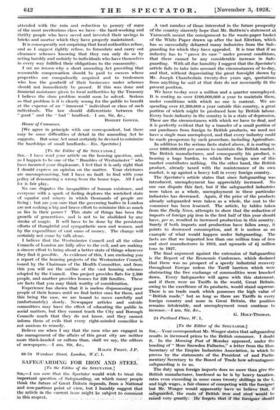SAFEGUARDING FOR IRON AND STEEL [To the Editor of the
SPECTATOR."
SIR,—I am sure that the Spectator would wish to treat the important question_ of Safeguarding, on which many people think the future of Great Britain depends, from a National and non-partisan point of view, but I humbly suggest that the article in the current lame might be subject to comment in this respect: . ;. ; --- : - ----- A vast number of those interested in the future prosperity of the country sincerely hope that Mr. Baldwin's statement at Yarmouth meant the consignment to the waste-paper basket of the White Paper drawn up after the last Election, which has so successfully debarred many industries from the Safe- guarding for which they have appealed. It is true that if an industry has to " prove its case " under present conditions, that there cannot be any considerable increase in Safe- guarding. - With all due humility I suggest that the Spectator'S article fails to take into account the circumstances of to-day, and that, without depreciating the great foresight shown by Mr. Joseph Chamberlain twenty-five years ago, quotations from anything he said at that date do not necessarily fit the present position.
We have to-day over a million and a quarter unemployed. It is costing us over £100,000,000 a year to maintain them, under conditions with which no one is content. We are spending over £1,200,000 a year outside this country, a great portion of which might be produced here by British labour. Every basic industry in the country is in a state of depression. These are the circumstances with which we have to deal, and it is perfectly evident that by a transfer of a small portion of our purchases from foreign to British products, we need not have a single man unemployed, and that every industry could be made prosperous by such procedure, including Agriculture.
In addition to the serious facts stated above, it is costing us over £800,000,000 per, annum to maintain the British market. The British manufacturer, and consequently his product, is bearing a huge burden, to which the foreign user of this market contributes nothing. On the other hand, the British product, already taxed with the maintenance of its own market, is up against a heavy toll in every foreign country.
The Spectator's article states that since Safeguarding was introduced, unemployment has appreciably increased. No one can dispute this fact, but if the safeguarded industries were taken as a whole, unemployment in these particular industries has decreased. Again, if the price of the products already safeguarded were taken as a whole, the cost to the consumer has been lessened. The article, by tables taken from the Daily News, attempts to show that the reduction of imports of foreign pig iron in the first half of this year should have, per se, resulted in increased production in this country. Surely if both imports and production have fallen away, it points to decreased consumption, and it is useless as an example- of what would happen under Safeguarding. The facts are that we imported less than one million tons of iron and steel manufactures in 1913, and upwards of 41 million- tons in 1927.
The final argument against the extension of Safeguarding is the Report of the Economic Conference, which declared that there was no prospect of a speedy industrial recovery throughout Europe unless the Tariff barriers which were obstructing the free exchange of commodities were knocked down. Every Safeguarder will agree with this statement, and if there, were no Tariffs in the world, Great Britain, owing to the excellence of its products, would stand supreme. There is net trade mark which possesses the high value of " British made," but so long as there are Tariffs in every foreign country and none in Great Britain, the position remains intolerable, and unemployment must continue to increase.—I am, Sir, &c.,


















































































































 Previous page
Previous page